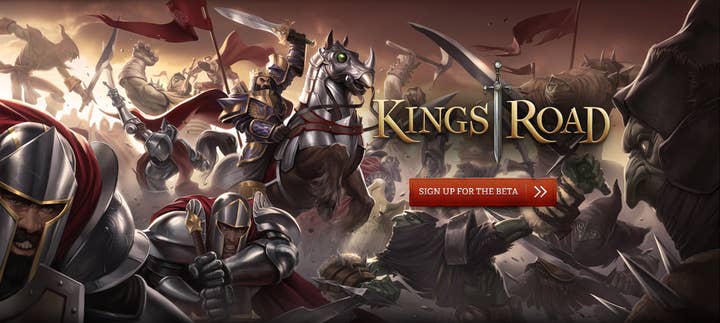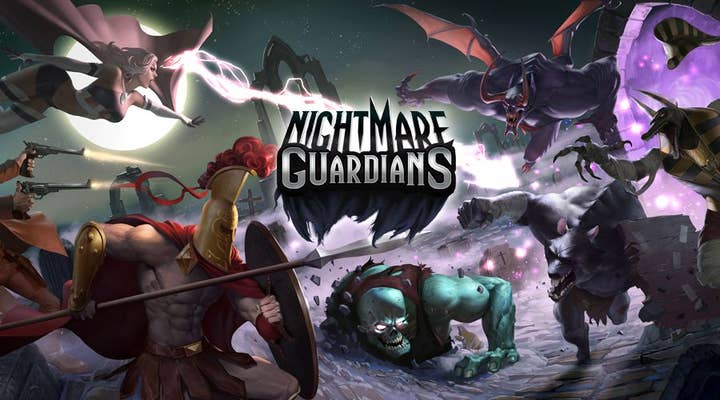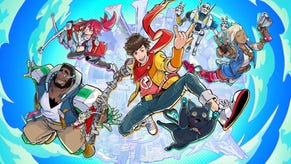Ready to Rumble: The Reinvention of The Games Publisher
Rumble CEO Greg Richardson, former head of BioWare/Pandemic, on how free-to-play and mobile will grow the industry to $100 billion
The brave new world of digital distribution, along with new mobile, social and browser platforms, has created a turbulent environment for game publishers. Traditional game publishers and developers are trying to adapt to the sweeping changes in the marketplace, and at the same time new companies are forming to take advantage of perceived opportunities in the marketplace. Once such company with a grand vision is Rumble Entertainment, billing itself as creator and publisher of premium multiplatform free-to-play games.
Rumble Entertainment, founded in 2011 by veterans from Gazillion, BioWare, Pandemic, and Electronic Arts, has been working on KingsRoad, a free-to-play action RPG for browsers currently in beta. Recently, Rumble Entertainment announced its first mobile title under development, Nightmare Guardians, a cooperative multiplayer game designed for tablets and the web. GamesIndustry International spoke with Greg Richardson, co-founder and CEO of Rumble Entertainment, about the company and its vision of the future of games.
Rumble Entertainment hasn't started out with a limited idea. “We set out with a very ambitious vision of combining the very best of game design and AAA production value that had been related to the PC packaged goods or the console world, but bringing it into the digital age,” says Richardson. That means, according to Richardson, making it free-to-play, hyper-accessible, cross-platform, and in the cloud so you can carry it with you all day.
"Fundamentally the game business is going through the single biggest inflection point since its birth"
Greg Richardson
Richardson definitely believes that tablets will be an important gaming platform in the future, but the field is still wide open. “There are some encouraging signs from companies like Natural Motion and Supercell, in terms of higher quality free-to-play game experiences on a tablet,” Richardson says. “But there isn't anything that's redefined what we've thought about it; that's what we're hoping Nightmare Guardians will be. For us, it's important because we're a publisher, and we're not aligned around a single product. While KingsRoad is initially targeting the browser and Facebook, we also want to show the world we think mobile and tablets are really important. The big innovation regarding tablets we're doing is a game that is primarily synchronous multiplayer.”
Why has Rumble chosen to make a mobile game that's synchronous multiplayer? “Let's start with the assumption we're making about why it's important, and that's about our fundamental belief that in large part people love to play games because of the social interaction,” Richardson notes. “To date on mobile, everything has been single-player, maybe with a connected asynchronous social experience, and we just don't think that that's what people want, as evidenced by the fact that almost every console and PC packaged goods game sold today is a synchronous multiplayer one.”
Synchronous multiplayer does make it more difficult, though, as Richardson admits. “It is a lot more work; there's a lot more technology involved. When we set out as a company with this ambition of creating great digital free-to-play games, we knew we had to build a publishing platform, and that was a back-end infrastructure that would get us across different devices and ecosystems and also support things like synchronous multiplayer. So we had to spend a lot of money and a lot of technology investment to do things like matchmaking, creating Rumble Friends, and leveraging, frankly, because we don't need to invent it all from scratch. There's Facebook Connect, and on the mobile side we'll leverage Game Center as well to make it really easy.”
That infrastructure can be shared among multiple games, which makes the investment more reasonable. ”We're using the exact same matchmaking, and Rumble Friends, and all the APIs out there, Facebook and all the rest - it's the exact same on KingsRoad as well as on Nightmare Guardians. They share technology, and hopefully we will subsequently announce other games. We're building both of those two games internally, but we've always planned and have been actively talking to third-party developers as well, those that share a similar vision with us about really high quality, free-to-play games for gamers.”
Rumble Entertainment is going against the conventional wisdom in some ways by forming a new publisher when long-time conventional publishers like EA and Activision have seen their stock prices languishing. While the traditional publishers are struggling to make a transition from the old world of games to the new world, Rumble feels that it's time to start a new company for the new era.

“Fundamentally the game business is going through the single biggest inflection point since its birth,” Richardson says. “It's a switch driven in large part by the fact that we are now surrounded by great connected gameplaying devices all day long, on phones, on laptop computers, and ecosystems that make gameplaying easier on Facebook, tablets. Consumers now want to live in a consumption-of-games-world that looks very different than 'I need two hours in front of my big-screen TV in my living room and I've got to master a controller and basically have the dexterity of a fighter pilot in order to play the game.'
"Consumers want a world in which we can now reach billions of people who can play the games very easily - shorter session lengths, very connected, they don't have to worry about whether their friend has an Xbox or a PlayStation or a PC or a Mac - everybody's equal in this new digital world. Finally, with free-to-play you don't have to spend $60 to figure out if you want the experience. You can try the game, and if you fall in love with it end up spending a lot of time and hopefully some money on it.”
While Rumble Entertainment bills itself as a publisher, Richardson has some problems with that term. “I think people think of publishers as kind of a business word that's distinct from creating products. We're primarily creators,” Richardson notes. “The people here are developers; we're inspired to create games that millions of people fall in love with. That's why we're doing this. The reasons we're a publisher are two-fold: One, in this world there is no retail. We have a direct relationship with our consumer, and so we wanted to be able to build out the world's best systems for communicating: community forums, web site, customer relationship management software, customer support software, business intelligence analytics. We wanted all that stuff to be as good as it could be so that beyond our game it feels like the player is staying at the Four Seasons when they're playing with us.”
“Reason two was, I just don't get people who believe they can scale creativity. Some of these companies, even some of these digital companies early have some success at what they do, they hire a thousand people to build twenty games. I've found that in any endeavor you need dedicated, passionate teams of people that believe in what they're making. It's really hard to artificially create that with any one company or any one culture. What we want to do is partner with great teams around the world who are inspired to make something that's going to be incredible, irresistible, high production values - and we can help them both with some capital and all the back-end software and technology we're building so they can focus on making great games. It's our re-invention of what a publisher is.”
Richardson feels that the free-to-play model is the key business model for games regardless of the platform. “Democratizing the access points for people to get into your experience is so important because you can reach a much broader audience,” Richardson explains. “A lot of the value these games have for players is their ability to connect with people. If you've got to convince your friend who wants to play with you to plunk down ten bucks before he knows if it's any fun, you just create friction that doesn't need to be there.”
The dark side of the free-to-play model is that it has a huge effect on game design; you can't just take a game design and slap a free-to-play business model on it and expect it to work. More than that, perhaps not all types of games are appropriate for the free-to-play model.
“There's a lot of learning, especially for those of us who have been building stand-alone games bought at retail, to apply this business model in a way that works for the player and that works for the business," Richardson says. "I think we're in the very early innings of understanding how players want to consume and pay for games in a free-to-play model, and what that means for designs and the kind of genres that you create games in.”
"It's not surprising that arguably the two most successful games in the world - certainly in the free-to-play space - are League of Legends and World of Tanks"
Greg Richardson
Richardson's view is that there's a huge amount of room for innovation with free-to-play games. “The model that seemed so prevalent really early on Facebook and iOS, when you got hard friction points with energy mechanics and you're kicking people out of games, that's going to go the way of the dodo bird. You're going to see more sophisticated and thoughtful ways of applying free-to-play design. It's not surprising that arguably the two most successful games in the world - certainly in the free-to-play space - are League of Legends and World of Tanks. Those have approached the way they monetize their games very, very differently than what you saw early in the Facebook or the mobile gaming space.”
Rumble Entertainment's focus on digital distribution as its only distribution method has multiple benefits for the company. “It allows you to invest less money before you understand how people are going to play and enjoy the game, which I think is beneficial to creativity,” Richardson notes. “Secondly, you have an opportunity to iterate with your players. Think of these games like restaurants; you open the restaurant but the feedback you're going to get on what people love on the menu, what worked with the service and how it all came together should shape the evolution, to get to the point where eventually you look for a Michelin star because people love coming there again and again. It's an ongoing dialogue and the players get much more invested in where the design goes than they ever have in the old world.”
The future of the gaming industry looks bright to Richardson. “We're barely scratching the surface of where it's going to go,” he says. “Fundamentally I think this is going to drive a huge amount of growth in the business. $50 billion was spent on games worldwide last year, and I think you're going to see the business grow to $100 billion in very short order. Think about all the new markets that get opened up geographically, and people can spend more money if they want to; there's a huge upside. China, Brazil and Russia have become really big, viable game markets in a way they were never going to be in the console world.”








.jpg?width=291&height=164&fit=crop&quality=80&format=jpg&auto=webp)
